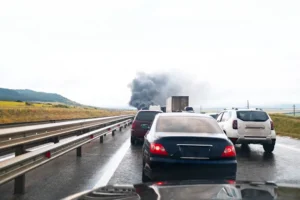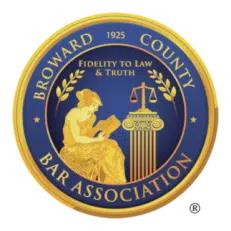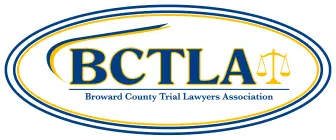 Multi-car accidents can happen without warning, leaving a trail of wreckage and confusion. In an instant, multiple cars are damaged, people are injured, and the authorities scramble to restore order.
Multi-car accidents can happen without warning, leaving a trail of wreckage and confusion. In an instant, multiple cars are damaged, people are injured, and the authorities scramble to restore order.
A multi-car accident occurs when multiple vehicles collide simultaneously or in a chain reaction crash. These accidents can cause significant damage and injuries. With so many actors involved, the question is: “Who is liable for a multi-car collision?” Let’s look at how fault is determined in the state of Florida.
If you or a loved one are involved in a multi-car accident in Florida, the Eltringham Law Group can help. Contact our experienced car accident attorneys today to help you get the compensation you deserve.
Determining Fault in a Multi-Car Accident in Florida
Determining fault in a multi-car crash is more challenging than deciding who was at fault in an accident involving two cars. In accidents involving multiple vehicles, when a driver acts negligently, their actions can cause other vehicles to follow suit. For example, if a car is hit from behind with force, it may collide with the car in front of it, creating a chain reaction.
Multiple car accidents can often be prevented if drivers adjust their behavior. Driver behavior plays a role in various causes of multi-car accidents, including excessive speed, driver distraction, tailgating, driver impairment caused by drugs and alcohol, and driver fatigue.
When multiple vehicles are involved in an accident, fault can be attributed to different parties based on the circumstances. Here are some common multi-car collision scenarios:
- Rear-end collisions: In rear-end accidents, the driver who rear-ends another vehicle is usually deemed at fault. Drivers must maintain a safe distance and exercise caution to prevent collisions.
- Intersection accidents: At intersections, determining fault in a multi-car accident can be more complex. Traffic signals, right-of-way, and driver negligence play significant roles. Careful analysis of the specific circumstances is necessary to assign fault accurately.
- Chain reaction crashes: In chain reaction accidents involving three or more vehicles, fault can be distributed among multiple drivers. Each driver’s negligence degree is assessed, and liability is assigned accordingly.
- Lane change multi-car accidents: If a car changes lanes and causes another car to collide with other vehicles, the car that changed lanes is generally considered at fault for the multi-car accident. Other vehicles involved may share responsibility if they could have prevented the crash by driving more carefully or paying closer attention.
Whose Insurance Pays in a Multi-Car Accident?
Determining fault for insurance coverage can be a complex affair. If it’s unclear who is at fault, the injured people need to consult an attorney for legal advice. The laws in your state, whether they follow a no-fault or at-fault system, will also influence how fault is determined.
Florida follows a “no-fault” system, which means each driver’s personal injury protection (PIP) insurance covers their medical expenses, regardless of fault. However, in cases where the injuries are severe or meet specific criteria, a liable driver’s insurance may be responsible for additional compensation.
If you were injured due to another driver’s mistake or negligence, Florida law allows you to recover damages and losses for severe injuries through a personal injury lawsuit.
What is Modified Comparative Negligence?
In multi-car accidents, one driver’s mistake can trigger a chain reaction, causing other drivers to become involved. While police may blame one driver, insurance companies may assign responsibility to multiple parties.
The concept of comparative negligence means that compensation for an injured person is proportional to each driver’s percentage of fault. Insurance adjusters will review police reports, medical records, and other factors to assess the settlement. Insurance companies may deny or delay large claims, which could result in a lawsuit for bad-faith insurance.
It’s important to note that as of March 2023, Florida has transitioned from pure comparative negligence to modified comparative negligence. This change means that if a person is partially at fault for an accident, their ability to recover damages may be limited. Understanding this change is essential in determining how liability and compensation are defined in multi-car accidents.
What Should You Do if Involved in a Multi-Car Accident?
In multi-car accidents, determining fault requires careful examination of the circumstances and applicable laws. An experienced attorney specializing in personal injury law can navigate the complexities of multi-car accident cases. They can assess fault, negotiate with insurance companies, gather evidence, and fight for fair compensation on your behalf.
At Eltringham Law Group, our team of dedicated attorneys is ready to provide expert guidance and support. If you or a loved one has been involved in a multi-car accident, contact our experienced legal team today for a compassionate and professional approach to your case.
The road to recovery starts with seeking the proper legal assistance. Contact us now for a free consultation.
Last updated Wednesday, May 22nd, 2024

 Multi-car accidents can happen without warning, leaving a trail of wreckage and confusion. In an instant, multiple cars are damaged, people are injured, and the authorities scramble to restore order.
Multi-car accidents can happen without warning, leaving a trail of wreckage and confusion. In an instant, multiple cars are damaged, people are injured, and the authorities scramble to restore order.




